Module 3 Body language and Non-verbal communication单元课件
文档属性
| 名称 | Module 3 Body language and Non-verbal communication单元课件 | 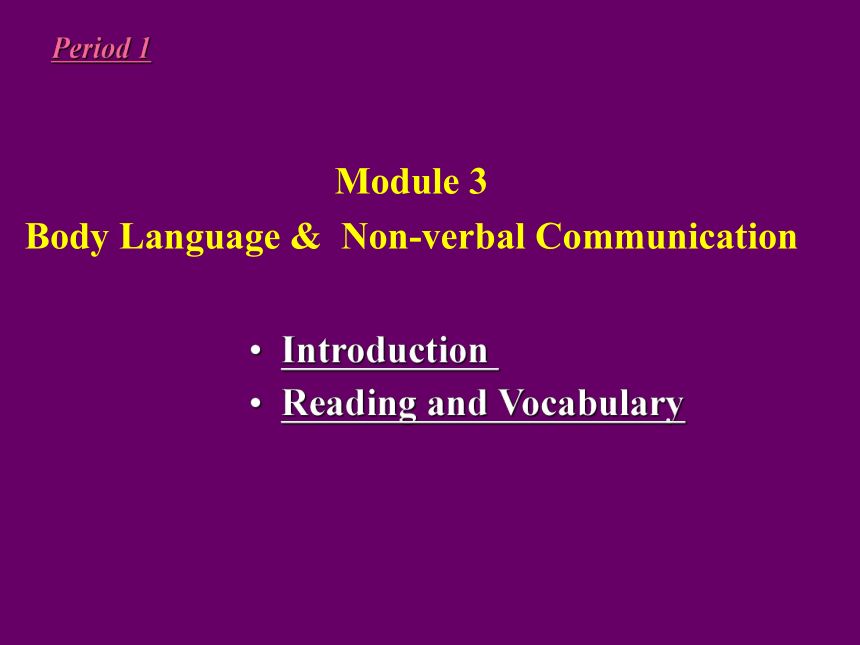 | |
| 格式 | rar | ||
| 文件大小 | 168.1KB | ||
| 资源类型 | 教案 | ||
| 版本资源 | 外研版 | ||
| 科目 | 英语 | ||
| 更新时间 | 2011-03-02 17:18:00 | ||
图片预览

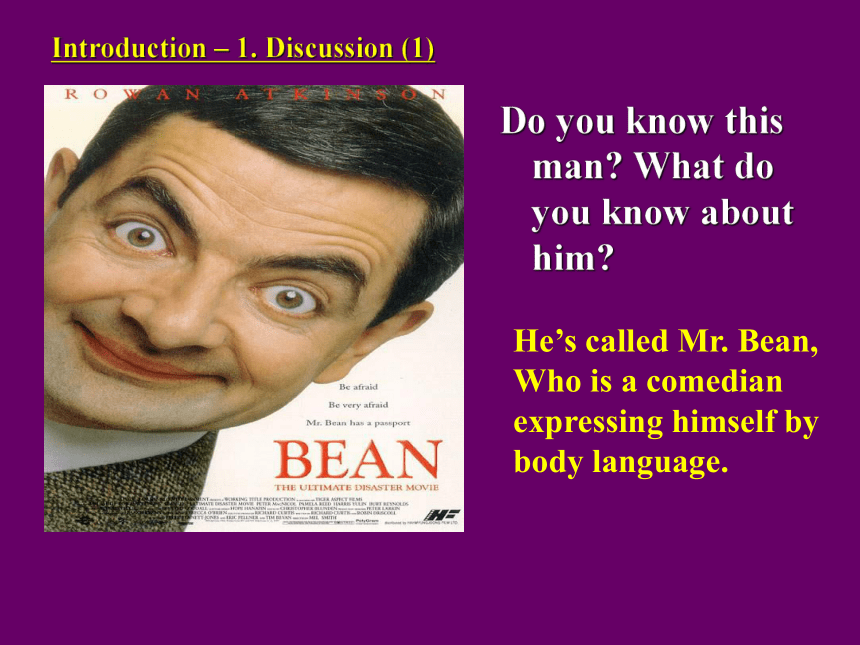

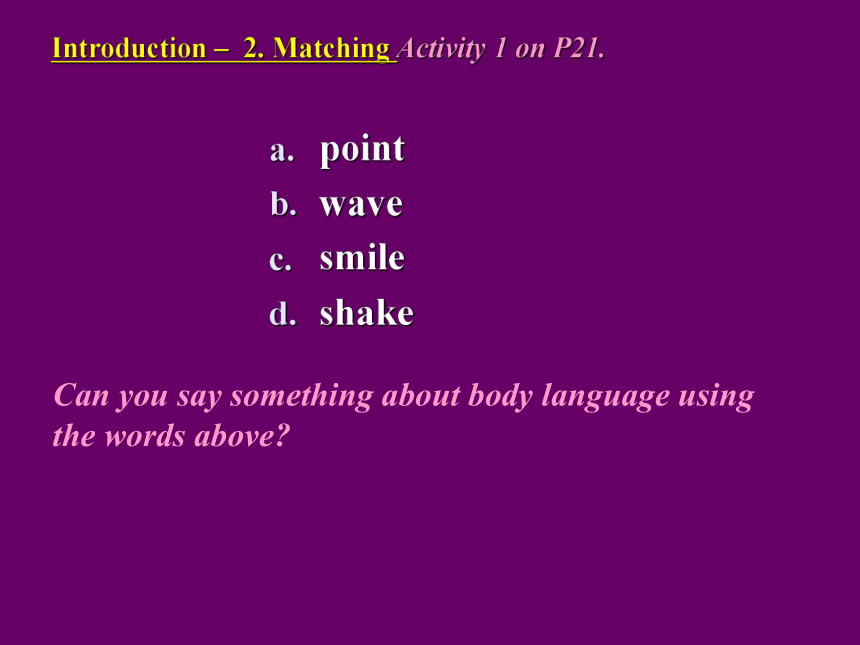
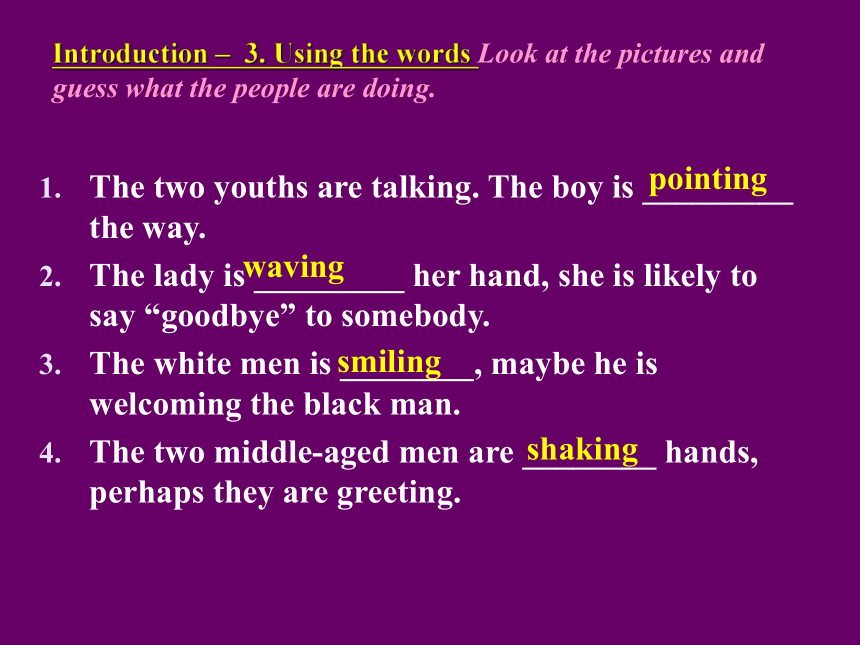
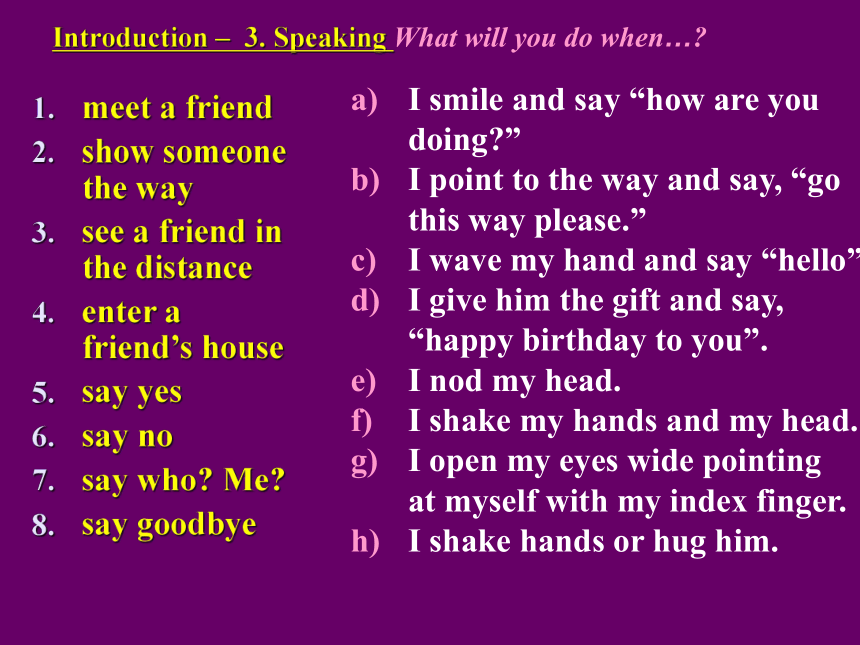
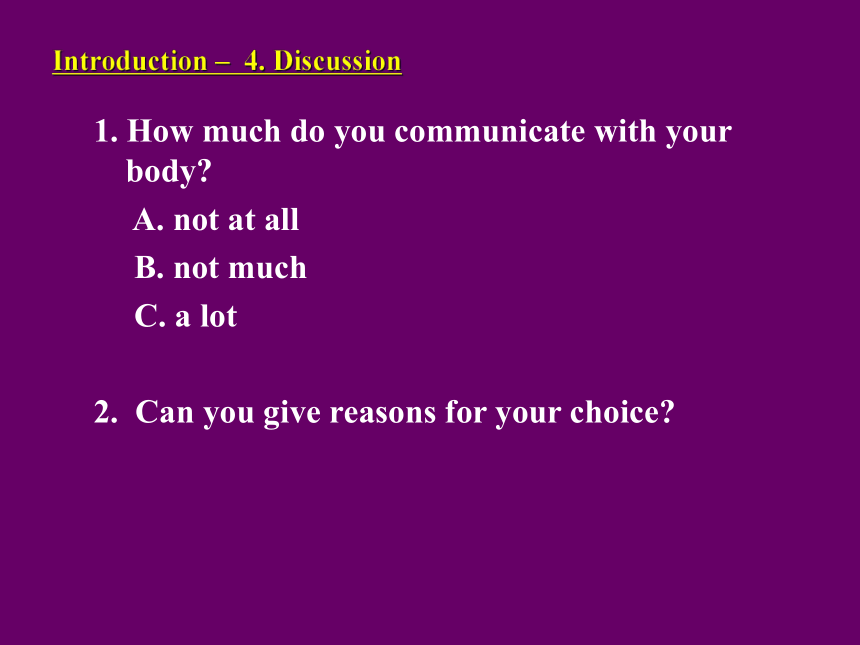
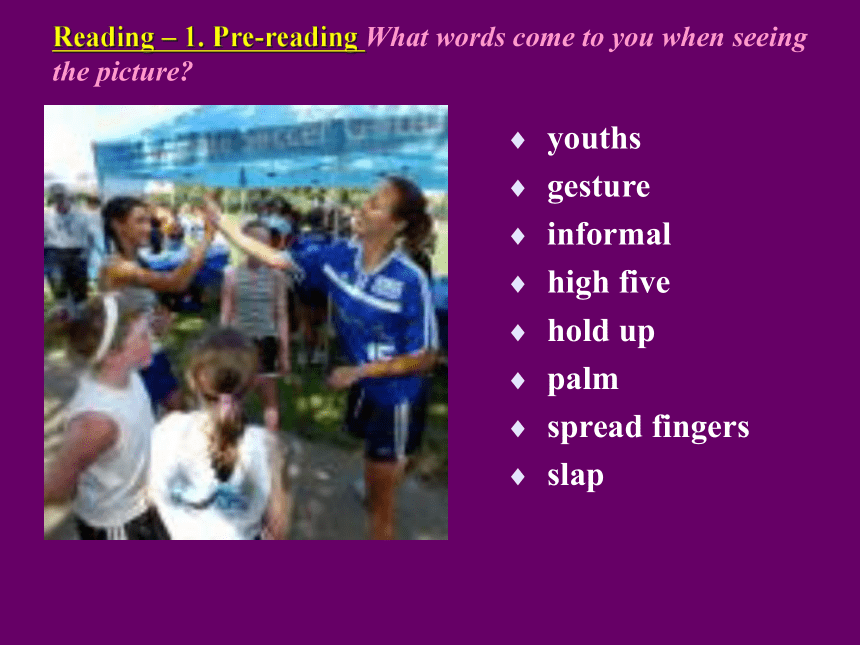
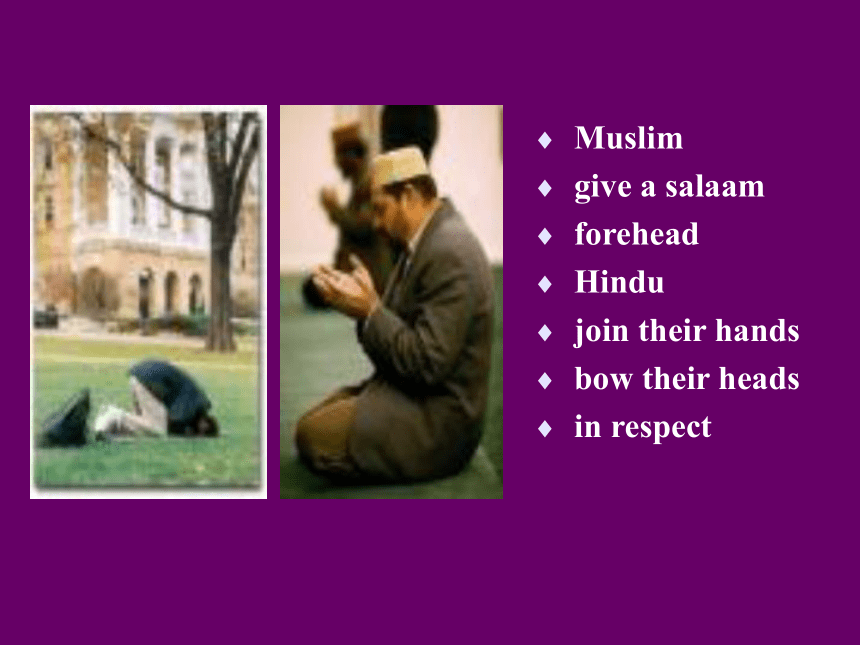

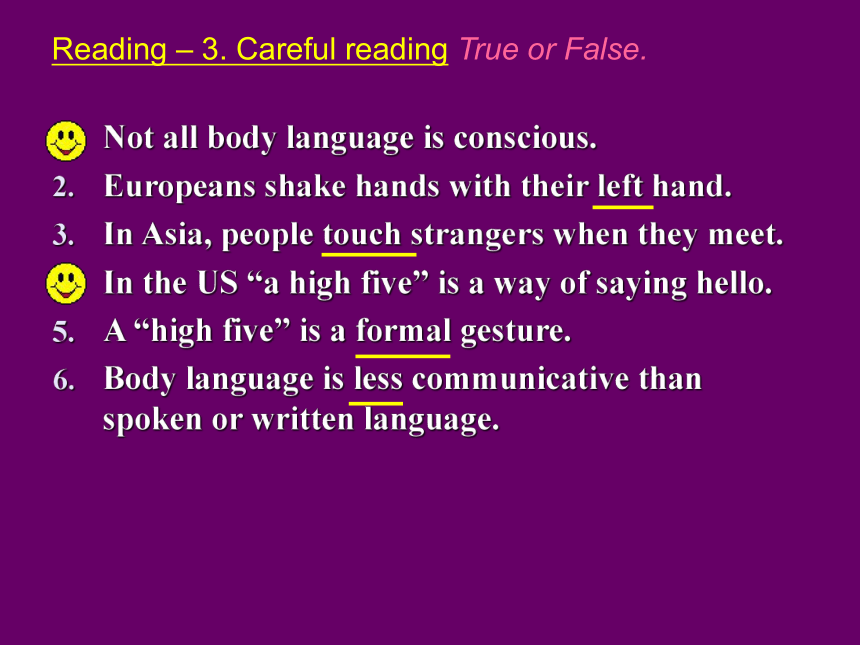
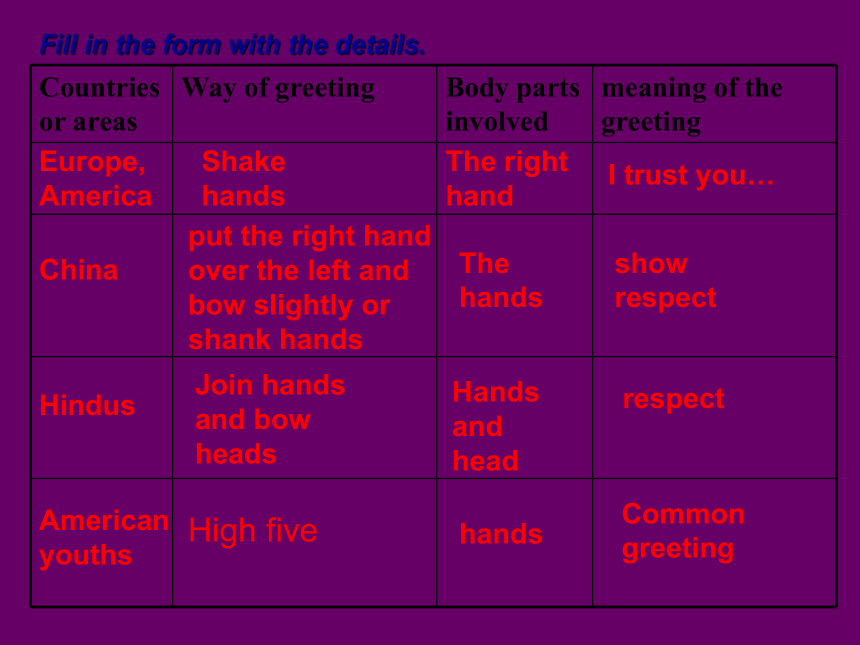
文档简介
课件71张PPT。Period 1Module 3
Body Language & Non-verbal Communication
Introduction
Reading and Vocabulary Introduction – 1. Discussion (1)Do you know this man? What do you know about him?He’s called Mr. Bean,
Who is a comedian expressing himself by body language.Introduction – 1. Discussion (2) Look at the pictures on the screen and discuss the meaning of them.Nice to meet you!Wonderful!
Good job!Happy New Year!point
wave
smile
shakeIntroduction – 2. Matching Activity 1 on P21.Can you say something about body language using the words above?The two youths are talking. The boy is _________ the way.
The lady is _________ her hand, she is likely to say “goodbye” to somebody.
The white men is ________, maybe he is welcoming the black man.
The two middle-aged men are ________ hands, perhaps they are greeting.
Introduction – 3. Using the words Look at the pictures and guess what the people are doing. pointingwavingsmilingshakingmeet a friend
show someone the way
see a friend in the distance
enter a friend’s house
say yes
say no
say who? Me?
say goodbye
Introduction – 3. Speaking What will you do when…? I smile and say “how are you doing?”
I point to the way and say, “go this way please.”
I wave my hand and say “hello”
I give him the gift and say, “happy birthday to you”.
I nod my head.
I shake my hands and my head.
I open my eyes wide pointing at myself with my index finger.
I shake hands or hug him.
1. How much do you communicate with your body?
A. not at all
B. not much
C. a lot
2. Can you give reasons for your choice? Introduction – 4. Discussion youths
gesture
informal
high five
hold up
palm
spread fingers
slap
Reading – 1. Pre-reading What words come to you when seeing the picture? Muslim
give a salaam
forehead
Hindu
join their hands
bow their heads
in respect
Choose the best title.
1. Saying It Without Words
2. When in Rome, Do as the Romans Do
3. Greeting Around the World
4. Read My Mind
Reading – 2. Fast-readingReading – 3. Careful reading True or False.Not all body language is conscious.
Europeans shake hands with their left hand.
In Asia, people touch strangers when they meet.
In the US “a high five” is a way of saying hello.
A “high five” is a formal gesture.
Body language is less communicative than spoken or written language.
Common greetingShake handsThe right handI trust you…ChinaHindusAmerican youthsput the right hand over the left and bow slightly or shank handsThe handsshow respectJoin hands and bow headsHands and head respectHigh fivehandsEurope, AmericaFill in the form with the details.Reading – 4. Word study Activity 3 on P23aggressive, deal, gesture, greet, formal,
informal, position, trust, unconscious, weapon Guns and knives are two different types of ____.
Someone who has a(n) __________ attitude may be violent.
You can ______ someone by saying “hello”
Your ______ is the way you are sitting or standing.
If you are _________ of something you do not know it is happening.
A(n) ____ is a business agreement.
weaponsaggressivegreetpositionunconsciousdeal7. An _____ is a movement of the body to communicate something.
8. If you _____ someone you believe them and rely on them.
9. “Give me five!” is a(n) _________greeting.
10. People are usually more _______ with people they don’t know.
aggressive, deal, gesture, greet, formal,
informal, position, trust, unconscious, weapongesturetrustinformalformalReading – 5. PhrasesCan you and your partner find out some useful phrases in the passage?more than
part of
vary from…to…
on guard
make a dealshake hands with
in respect
be busy with
hold up
give awayReading – 6. Post-readingQuestion for discussion:
Do you think it is important to know about non-verbal communication in different cultures? Why do you think that way?HWTry to retell the passage with the help of the key phrases noted down by you.
Find more information about different greetings in other cultures.
2. Finish off the exercise related to vocabulary and reading in the Workbook.
Period 2Module 3
Body Language & Non-verbal Communication
Listening and Vocabulary
Pronunciation
Everyday English Listening – Knowing the parts of the body.1. head 2. ear
3. forehead 4. eye
5. nose 6. lips
7. neck 8. shoulder
9. arm 10. hand
11. chest 12. wrist
13. knee 14. leg
15. foot 16. eyebrow
17. finger 18. ankleListening – vocabulary Complete the sentences. You use your lips to _____ someone.
If you _______ at someone you look at them for a long time.
If you ____ your hand you lift it up.
You ___ by moving your head up and down.
When you bend your upper body forwards you _____.
You have to _____ your knees to sit down.
If you’re hot you can ____ the sweat from your forehead.
At the end of a concert or a play it is usual to ___. bend / bow / clap / hug / kiss / nod / raise / stare / wipekissstareraisenodbowbendwipeclapListening – First listening Listen and number them in the order they are mentioned. What to talk about
When to arrive for dinner
How to meet new people
When to leave the table
Gifts
What to call people
What to say to the host when you leave
6541327Listening – Matching Activity 4 on P25.Answers:
What to talk about
When to arrive for dinner
How to meet new people
When to leave the table
Gifts
What to call people
What to say to the host when you leavefe, iagb, cdhListening –Second listening Fill in the blanks with the missing words.B=Bill, L=Li Hong
B: Hi, Li Hong. How are you doing? I hear you’re ______ to the states.
L: That’s right, Bill. I’m going to stay in America for ________ months.
B: That’s great. But you look a bit _________. What’s the problem?
L: Look, Bill, can I ask you a _______? I need some advice about what to do… or better still, what not to do there.
B: Oh you mean _________? Of course.
L: For example, what should I do when I meet new people?
B: Shake hands at the first meeting. ________they are, Americans don't usually like to call each other by their family name: it sounds too ______.offthreefed upfavorcustomsWhoeverformalL: What shall I do if I’m _______ to dinner?
B: When you’re invited to someone’s home, _____________________ bring a gift for your host. It doesn’t have to be something expensive, perhaps some flowers or a bottle of wine. And _________ for people to open gifts when they receive them, so don't be ________. __________________we do things in the States.
L: Ok.
B: Be _____________ on time, not very early and not very late.invitedsurprisedmore or lessit’s a good idea toit’s usualThat’s the wayL: What _______ can I talk about?
B: It’s best to avoid any __________ conversations topics. So avoid politics or ________ completely.
If your mind _________, try not to _____. Remember to smile and ____________ and unless you’ve very unlucky you’ll soon think of something. In difficult situations I always talk about the weather.
on earthreligionheavy-going goes blankstay relaxedpanicL: Oh, good idea.
B: If you have a meal don’t start eating before everyone is ______. And ________ you do, don’t leave immediately after the meal is finished. That could __________.
L: Right.
B: But when you ___ _____, ___________thank your host for “a wonderful evening”. Oh, and one last thing to remember…
L: Yes?
B: I know you’ll really enjoy yourself so be sure to ___________________.
servedwhateverdo leaveseem rudebe sure tohave a great timePronunciation – Activity 1Listen to the speaker with an American accent.
Then listen to the speaker with a British accent.
Can you find out the differences in the sounds?Pronunciation– Activity 2Listen to the speakers. Do they speak in an American or a British accent?
Answers: UK
UK
USEveryday English Decide what the phrases mean? 1. Can I ask you a favour?
(a) Can I do something for you?
(b) Can you do something for me?
2. How are you doing?
(a) How are you?
(b) What are you doing?3. What on earth can I talk about?
(a) There’s lots to talk about.
(b) I don’t know what to talk about.
4. Have a great time!
(a) Enjoy yourself.
(b) Stay a long time.
TaskWork in pairs. Try to tell about the customs in the US with the help of the advice given in Activity 4 in Listening (P25). HomeworkWrite a passage, introducing the customs in the US with the help of the advice given in Activity 4 in Listening (P25). Period 3Module 3
Body Language & Non-verbal Communication
Grammar 1,2&3
Adverbial clause of conditionRevisionTranslation: (from Reading)
如果你说“交际”这个词,大部分人想到单词和句子。
当我们被介绍给陌生人时,我们使用“习得”的身体语言。If you say the word “communication”, most people think of words and sentences.We use “learnt” body language when we are introduced to strangers.Grammar 1 – Activity 1Now tick the true statements about the two sentences.
The sentences …
1. Describe common situations
2. Describe impossible situations
3. Use if or when to introduce the situation
4. Explain the result of the situation in the other part of the sentence
5. Use the present simple tense in both parts of the sentence
Can you find more examples of sentences with if or when in the passage?
Grammar 1 – Activity 2 If our right hand is busy greeting someone, it can’t be holding a weapon.
If you shake hands with someone, you show you trust them.
When we greet someone, we put the right hand over the left and bow slightly.
We shake hands when we make a deal.
Grammar 1 – StudyStudy the sentences below and answer the question.
Q: 条件状语从句通常由什么连词或词组引导?
If I see her, I’ll invite her to the party.
You’ll be late for school unless you get up half an hour earlier.
As long as you work hard, you’ll succeed sooner or later.
Suppose you fail, what will you do next?观察动词的时态,可以得出什么结论?
I’ll not say anything unless he asks me.
If you raise your hand, the taxi will stop.Conclusion: 在条件状语从句中,用一般现在时代替一般将来时。Grammar 1 – Activity 3 on Page 24.Answers to Activity 3.E
C
B
F
D
AGrammar 2 - ExercisesFill in the blanks with the right form of the words given.
a. If you _____ someone you usually _____ his/her hand. (meet, shake)
b. What ____ I do if I’m invited to dinner?
c. Unless you’re very unlucky you ____ soon think of something.meetshakeshallwillQ: 1. Which refers to a normal everyday situation?
2. Which refers to a possibility in the future?
3. Which word in the 3rd sentence means “if…not”?abunlessGrammar 2 – Activity 2If you _____ a cake your host___________ very pleased. (take, be)
Unless the weather______ better, I___________ at home. (get, stay)
He____________ home early if he ___________ well. (go, not feel)
What _______ I _______ if they ______ about politics? (do, talk)
If you ______ your hand the taxi__________. (raise, stop)
I ______________ anything unless he ______ me. (not say, ask)takewill begetswill staywill godoesn’t feeltalkshall doraisewill stopwill not say asksGrammar 3 – Adverbial clause of concessionEnjoy a song and fill out the blankets.
Right here waiting
_______ you go, _______ you do, I will be right here waiting for you . ________ it takes, or how my heart breaks, I will be right here waiting for you WhereverWhateverWhereverGrammar 3 – Activity 1 on P27Read the sentences and choose the correct meaning.
1. Whatever you do, don’t leave immediately after the meal is finished.
a. It is important to leave immediately after the meal has finished.
b. Don’t do anything after the meal has finished.
c. You can do anything you like after the meal has finished.
d. It is important not to leave immediately after the meal has finished.Grammar 3 – Activity 12. However hungry you are, you shouldn’t start to eat before your host does.
a. If you are very hungry you can start to eat.
b. Even if you are very hungry you should wait.
c. It is important to start eating before your host.
d. Don’t eat anything if you’re not hungry.
Can you do it?
no matter what =
no matter who =
no matter when =
no matter where =
no matter which =
no matter how =whateverwhoeverwheneverwhereverwhicheverhoweverConclusion:让步状语从句可以由以上从属连词引导。Grammar 3 – Activity 1 on Page 27Complete the sentences below.
_______ I feel lonely, I think about you.
_______ he is, he is very rude to me!
_______ I go, I always meet interesting people.
You can invite _______ you like to the party.
________ late you arrive, I’ll come and meet you.
I feel shy ________ she says hello to me.
I hear that song ________ I switch on the radio.
_________ much I study, I find these exercises difficult.whoeverwheneverWhereverHoweverWheneverWhereverHoweverwheneverGrammar 3 – More about Adverbial Clause of ConcessionStudy:
Q: However 修饰什么?从句的结构是?
However rich your are, you shouldn’t waste money.
However hard she tried, nothing seemed to work.
Conclusion:However常形容词或副词。
从句的结构为however +adj./adv.+其他成分。Grammar 3 – More about Adverbial Clause of ConcessionStudy:
Q: Which of the following are right? What conclusion can you draw?
1. No matter what you say is of no use now.
Whatever you say is of no use now.
2. Prisoners have to eat no matter what they're given.
Prisoners have to eat whatever they’re given.Conclusion:
no matter 不能引导主语从句和宾语从句。 Grammar 3 – More about Adverbial Clause of ConcessionQ: 让步状语从句还可以由哪些从属连词引导?
Although it's raining, they are still working in the field.
Though the sore be healed, yet a scar may remain.
We'll make a trip even though the weather is bad.
Whether you believe it or not, it is true.
Conclusion:
though, although引导的让步状语从句,后面的从句不能有but,但是 though 和yet可连用.PracticeStrange ______ his behavior may be, there is a very good reason for it.
a. although b. even if
c. that d. as
?? ______ knows the name of this song will receive a prize from the radio station.
a. Whoever b. Those
c. Whichever people d. Any people
______ convincing an argument is, it needs support of evidence.
a. Whatever b. However
c. Although d. Even if
??
______ we gave him anything to eat, he would save it up for his little brother.
a. When b. That
c. Whenever d. What______ difficulties we may come across, we will help one another to get over them.
a. Whatever b. Whichever
c. However d. What
?Although Mr smith is one of those teachers who appear to be friendly, ______ he is very hard to deal with.
a. but b. so
c. so that d. yetHomework
Finish off the exercises about grammar in Workbook.Period 4Module 3
Body Language & Non-verbal Communication
Function
Speaking
Cultural Corner
WritingFunction Should or must?
You _______ shake hands when you meet new people.
You ________thank your host for a wonderful evening.shouldmustQ: Which one means…?
It’s a good idea to…
It’s very important to…shouldmustConclusion:
Should: give advice; must: give strong adviceshould, shouldn’t, must or mustn’t.
In France you ______ shake hands every time you say hello and goodbye.
In Thailand you ________ touch someone on the head, even by accident.
In Spain you ______ wait until 10 pm before you have dinner.
In Japan you ________ give a penknife as a present.
In Russia you _______ make a toast every time you take a sip from your glass.
shouldmustn’tshouldshouldn’tmustSpeaking – Role-play on Page 27.Work in pairs. Do the role-play.
Student A: An American visitor to China. Ask B for advice on Chinese customs.
Student B: A Chinese student. Student A’s friend. Give B advice using should or must or sentences beginning with if.Situations:
be introduced to others; be invited;
meet someone familiar; talk to people;
say goodbye……Cultural CornerRead the passage and answer the questions.
Why do people clap?
2. When do people clap in China?To show that they like something.(Open answer)Can you find out some useful phrases with your partner?
at the end of
a live performance
in competition with
a sign of
add…to
change from...to…Writing – Activity 1 on Page 28Read the invitations and answer the questions.
Who’s the first invitation from?
Who is the second invitation from?
Which is formal of informal? How do you know?Mr and Mrs Harry Blunkett.Sylvia.The first invitation is formal. We know it because of the language used.Writing – Filling in.Fill in the missing words according to the invitation.
Mr and Mrs Harry Blunkett _____________________ of your _______ at the wedding of their daughter Elizabeth Ann Blunkett _____ Mr Jack Humphries, at St David’s Church, Landrindod Wells on Saturday March 5th at 17:00, __________ a dinner dance at the Hotel Metrople.
Black tie RSVPrequest the pleasurecompanytofollowed byWriting – Activity 2 on Page 28Answers:
Formal:
Informal:thanks a lotpleased to accept; unable to accept; I’m very sorryWork in pairs. Write a short reply to one of the invitations, using one of the expressions from activity 2.
Then exchange the writing with that of another pair. Study and improve your own.
Report it to all.Homework
Improve your own writing.
Try to do the writing on Page 84 in Workbook.Language Date BankLanguage points for Reading 尽管单词和句子很重要,但我们不仅是用口语和书面语进行交流。
_________ these are very important, we communicate with _____ _____ just _______ and _________ words.
Althoughmore thanspokenwrittenmore than: 不仅是,远甚于冬眠不是一般的睡眠, 那是一种沉睡.
Hibernation is____ _____ ______. It is a deep sleep.
more than sleep亚洲人打招呼是不接触他人身体的,但经常会用到手。
____ in Asian countries do not ______ ________ the other person, but they always ________ the hands.
Greetingsinvolve touchinginvolveinvolve 涉及,包括eg:
This project involves a lot of work.
All the children were involved in the school play.
be involved in…包含在…, 与…有关.Like other animals, we are on guard until we know it is safe to relax.
be on guard 有警惕,心存戒备
eg:
When you go to a stranger place, be on guard.
We should be on guard to make sure the students are safe.
如果手在忙于打招呼,就不可能拿武器。
If your hand ___ ____ _______ someone, it
____ ____ ____ ______ a weapon.
be busy doing sth.
be busy with sth.
I’m busy doing my homework.
I’m busy with my homework.
is busy greetingcan not be holdingPeople give away much more by their gestures than by their words.
give away: “泄露;暴露”
What does “give away” mean in the following sentences?
He gave away most of his money to charity.
The bride was given away by her father.
She gave away state secrets to the enemy.
We have given away the last chance of winning the match.免费赠送将……交给泄露;出卖因大意而失去机会Body language is fascinating for anyone to study.
sth. + be + adj. + to do
= It + be + adj. + to do
eg:
Books are interesting to read.
=It’s interesting to read books.
ex:
他是个很难相处的人。He is difficult to get along with.Difficult sentence:We see examples of unconscious body language very often, yet there is also “learned” body language, which varies from culture to culture.
解析:这是一个并列句,连词是yet,表示“尽管;然而”。yet后的并列分句中有一个which引导的非限制性定语从句,用来修饰 “learned” body language.
ex: 我没有成功,尽管如此我还是会努力的。I have failed, yet I’ll try again.Exercises:Fill in the blanks with one word learnt in the module.
When a person is angry, he may be a________.
While watching the performance, the audience cheered and c_______ their hands.
I felt my son’s f_______ and found that he had got a fever.
He didn’t have f______ training in school, but he is great in science.
We should avoid s_____ at people as it’s bad manners.ggressivelappedoreheadormaltaring
Body Language & Non-verbal Communication
Introduction
Reading and Vocabulary Introduction – 1. Discussion (1)Do you know this man? What do you know about him?He’s called Mr. Bean,
Who is a comedian expressing himself by body language.Introduction – 1. Discussion (2) Look at the pictures on the screen and discuss the meaning of them.Nice to meet you!Wonderful!
Good job!Happy New Year!point
wave
smile
shakeIntroduction – 2. Matching Activity 1 on P21.Can you say something about body language using the words above?The two youths are talking. The boy is _________ the way.
The lady is _________ her hand, she is likely to say “goodbye” to somebody.
The white men is ________, maybe he is welcoming the black man.
The two middle-aged men are ________ hands, perhaps they are greeting.
Introduction – 3. Using the words Look at the pictures and guess what the people are doing. pointingwavingsmilingshakingmeet a friend
show someone the way
see a friend in the distance
enter a friend’s house
say yes
say no
say who? Me?
say goodbye
Introduction – 3. Speaking What will you do when…? I smile and say “how are you doing?”
I point to the way and say, “go this way please.”
I wave my hand and say “hello”
I give him the gift and say, “happy birthday to you”.
I nod my head.
I shake my hands and my head.
I open my eyes wide pointing at myself with my index finger.
I shake hands or hug him.
1. How much do you communicate with your body?
A. not at all
B. not much
C. a lot
2. Can you give reasons for your choice? Introduction – 4. Discussion youths
gesture
informal
high five
hold up
palm
spread fingers
slap
Reading – 1. Pre-reading What words come to you when seeing the picture? Muslim
give a salaam
forehead
Hindu
join their hands
bow their heads
in respect
Choose the best title.
1. Saying It Without Words
2. When in Rome, Do as the Romans Do
3. Greeting Around the World
4. Read My Mind
Reading – 2. Fast-readingReading – 3. Careful reading True or False.Not all body language is conscious.
Europeans shake hands with their left hand.
In Asia, people touch strangers when they meet.
In the US “a high five” is a way of saying hello.
A “high five” is a formal gesture.
Body language is less communicative than spoken or written language.
Common greetingShake handsThe right handI trust you…ChinaHindusAmerican youthsput the right hand over the left and bow slightly or shank handsThe handsshow respectJoin hands and bow headsHands and head respectHigh fivehandsEurope, AmericaFill in the form with the details.Reading – 4. Word study Activity 3 on P23aggressive, deal, gesture, greet, formal,
informal, position, trust, unconscious, weapon Guns and knives are two different types of ____.
Someone who has a(n) __________ attitude may be violent.
You can ______ someone by saying “hello”
Your ______ is the way you are sitting or standing.
If you are _________ of something you do not know it is happening.
A(n) ____ is a business agreement.
weaponsaggressivegreetpositionunconsciousdeal7. An _____ is a movement of the body to communicate something.
8. If you _____ someone you believe them and rely on them.
9. “Give me five!” is a(n) _________greeting.
10. People are usually more _______ with people they don’t know.
aggressive, deal, gesture, greet, formal,
informal, position, trust, unconscious, weapongesturetrustinformalformalReading – 5. PhrasesCan you and your partner find out some useful phrases in the passage?more than
part of
vary from…to…
on guard
make a dealshake hands with
in respect
be busy with
hold up
give awayReading – 6. Post-readingQuestion for discussion:
Do you think it is important to know about non-verbal communication in different cultures? Why do you think that way?HWTry to retell the passage with the help of the key phrases noted down by you.
Find more information about different greetings in other cultures.
2. Finish off the exercise related to vocabulary and reading in the Workbook.
Period 2Module 3
Body Language & Non-verbal Communication
Listening and Vocabulary
Pronunciation
Everyday English Listening – Knowing the parts of the body.1. head 2. ear
3. forehead 4. eye
5. nose 6. lips
7. neck 8. shoulder
9. arm 10. hand
11. chest 12. wrist
13. knee 14. leg
15. foot 16. eyebrow
17. finger 18. ankleListening – vocabulary Complete the sentences. You use your lips to _____ someone.
If you _______ at someone you look at them for a long time.
If you ____ your hand you lift it up.
You ___ by moving your head up and down.
When you bend your upper body forwards you _____.
You have to _____ your knees to sit down.
If you’re hot you can ____ the sweat from your forehead.
At the end of a concert or a play it is usual to ___. bend / bow / clap / hug / kiss / nod / raise / stare / wipekissstareraisenodbowbendwipeclapListening – First listening Listen and number them in the order they are mentioned. What to talk about
When to arrive for dinner
How to meet new people
When to leave the table
Gifts
What to call people
What to say to the host when you leave
6541327Listening – Matching Activity 4 on P25.Answers:
What to talk about
When to arrive for dinner
How to meet new people
When to leave the table
Gifts
What to call people
What to say to the host when you leavefe, iagb, cdhListening –Second listening Fill in the blanks with the missing words.B=Bill, L=Li Hong
B: Hi, Li Hong. How are you doing? I hear you’re ______ to the states.
L: That’s right, Bill. I’m going to stay in America for ________ months.
B: That’s great. But you look a bit _________. What’s the problem?
L: Look, Bill, can I ask you a _______? I need some advice about what to do… or better still, what not to do there.
B: Oh you mean _________? Of course.
L: For example, what should I do when I meet new people?
B: Shake hands at the first meeting. ________they are, Americans don't usually like to call each other by their family name: it sounds too ______.offthreefed upfavorcustomsWhoeverformalL: What shall I do if I’m _______ to dinner?
B: When you’re invited to someone’s home, _____________________ bring a gift for your host. It doesn’t have to be something expensive, perhaps some flowers or a bottle of wine. And _________ for people to open gifts when they receive them, so don't be ________. __________________we do things in the States.
L: Ok.
B: Be _____________ on time, not very early and not very late.invitedsurprisedmore or lessit’s a good idea toit’s usualThat’s the wayL: What _______ can I talk about?
B: It’s best to avoid any __________ conversations topics. So avoid politics or ________ completely.
If your mind _________, try not to _____. Remember to smile and ____________ and unless you’ve very unlucky you’ll soon think of something. In difficult situations I always talk about the weather.
on earthreligionheavy-going goes blankstay relaxedpanicL: Oh, good idea.
B: If you have a meal don’t start eating before everyone is ______. And ________ you do, don’t leave immediately after the meal is finished. That could __________.
L: Right.
B: But when you ___ _____, ___________thank your host for “a wonderful evening”. Oh, and one last thing to remember…
L: Yes?
B: I know you’ll really enjoy yourself so be sure to ___________________.
servedwhateverdo leaveseem rudebe sure tohave a great timePronunciation – Activity 1Listen to the speaker with an American accent.
Then listen to the speaker with a British accent.
Can you find out the differences in the sounds?Pronunciation– Activity 2Listen to the speakers. Do they speak in an American or a British accent?
Answers: UK
UK
USEveryday English Decide what the phrases mean? 1. Can I ask you a favour?
(a) Can I do something for you?
(b) Can you do something for me?
2. How are you doing?
(a) How are you?
(b) What are you doing?3. What on earth can I talk about?
(a) There’s lots to talk about.
(b) I don’t know what to talk about.
4. Have a great time!
(a) Enjoy yourself.
(b) Stay a long time.
TaskWork in pairs. Try to tell about the customs in the US with the help of the advice given in Activity 4 in Listening (P25). HomeworkWrite a passage, introducing the customs in the US with the help of the advice given in Activity 4 in Listening (P25). Period 3Module 3
Body Language & Non-verbal Communication
Grammar 1,2&3
Adverbial clause of conditionRevisionTranslation: (from Reading)
如果你说“交际”这个词,大部分人想到单词和句子。
当我们被介绍给陌生人时,我们使用“习得”的身体语言。If you say the word “communication”, most people think of words and sentences.We use “learnt” body language when we are introduced to strangers.Grammar 1 – Activity 1Now tick the true statements about the two sentences.
The sentences …
1. Describe common situations
2. Describe impossible situations
3. Use if or when to introduce the situation
4. Explain the result of the situation in the other part of the sentence
5. Use the present simple tense in both parts of the sentence
Can you find more examples of sentences with if or when in the passage?
Grammar 1 – Activity 2 If our right hand is busy greeting someone, it can’t be holding a weapon.
If you shake hands with someone, you show you trust them.
When we greet someone, we put the right hand over the left and bow slightly.
We shake hands when we make a deal.
Grammar 1 – StudyStudy the sentences below and answer the question.
Q: 条件状语从句通常由什么连词或词组引导?
If I see her, I’ll invite her to the party.
You’ll be late for school unless you get up half an hour earlier.
As long as you work hard, you’ll succeed sooner or later.
Suppose you fail, what will you do next?观察动词的时态,可以得出什么结论?
I’ll not say anything unless he asks me.
If you raise your hand, the taxi will stop.Conclusion: 在条件状语从句中,用一般现在时代替一般将来时。Grammar 1 – Activity 3 on Page 24.Answers to Activity 3.E
C
B
F
D
AGrammar 2 - ExercisesFill in the blanks with the right form of the words given.
a. If you _____ someone you usually _____ his/her hand. (meet, shake)
b. What ____ I do if I’m invited to dinner?
c. Unless you’re very unlucky you ____ soon think of something.meetshakeshallwillQ: 1. Which refers to a normal everyday situation?
2. Which refers to a possibility in the future?
3. Which word in the 3rd sentence means “if…not”?abunlessGrammar 2 – Activity 2If you _____ a cake your host___________ very pleased. (take, be)
Unless the weather______ better, I___________ at home. (get, stay)
He____________ home early if he ___________ well. (go, not feel)
What _______ I _______ if they ______ about politics? (do, talk)
If you ______ your hand the taxi__________. (raise, stop)
I ______________ anything unless he ______ me. (not say, ask)takewill begetswill staywill godoesn’t feeltalkshall doraisewill stopwill not say asksGrammar 3 – Adverbial clause of concessionEnjoy a song and fill out the blankets.
Right here waiting
_______ you go, _______ you do, I will be right here waiting for you . ________ it takes, or how my heart breaks, I will be right here waiting for you WhereverWhateverWhereverGrammar 3 – Activity 1 on P27Read the sentences and choose the correct meaning.
1. Whatever you do, don’t leave immediately after the meal is finished.
a. It is important to leave immediately after the meal has finished.
b. Don’t do anything after the meal has finished.
c. You can do anything you like after the meal has finished.
d. It is important not to leave immediately after the meal has finished.Grammar 3 – Activity 12. However hungry you are, you shouldn’t start to eat before your host does.
a. If you are very hungry you can start to eat.
b. Even if you are very hungry you should wait.
c. It is important to start eating before your host.
d. Don’t eat anything if you’re not hungry.
Can you do it?
no matter what =
no matter who =
no matter when =
no matter where =
no matter which =
no matter how =whateverwhoeverwheneverwhereverwhicheverhoweverConclusion:让步状语从句可以由以上从属连词引导。Grammar 3 – Activity 1 on Page 27Complete the sentences below.
_______ I feel lonely, I think about you.
_______ he is, he is very rude to me!
_______ I go, I always meet interesting people.
You can invite _______ you like to the party.
________ late you arrive, I’ll come and meet you.
I feel shy ________ she says hello to me.
I hear that song ________ I switch on the radio.
_________ much I study, I find these exercises difficult.whoeverwheneverWhereverHoweverWheneverWhereverHoweverwheneverGrammar 3 – More about Adverbial Clause of ConcessionStudy:
Q: However 修饰什么?从句的结构是?
However rich your are, you shouldn’t waste money.
However hard she tried, nothing seemed to work.
Conclusion:However常形容词或副词。
从句的结构为however +adj./adv.+其他成分。Grammar 3 – More about Adverbial Clause of ConcessionStudy:
Q: Which of the following are right? What conclusion can you draw?
1. No matter what you say is of no use now.
Whatever you say is of no use now.
2. Prisoners have to eat no matter what they're given.
Prisoners have to eat whatever they’re given.Conclusion:
no matter 不能引导主语从句和宾语从句。 Grammar 3 – More about Adverbial Clause of ConcessionQ: 让步状语从句还可以由哪些从属连词引导?
Although it's raining, they are still working in the field.
Though the sore be healed, yet a scar may remain.
We'll make a trip even though the weather is bad.
Whether you believe it or not, it is true.
Conclusion:
though, although引导的让步状语从句,后面的从句不能有but,但是 though 和yet可连用.PracticeStrange ______ his behavior may be, there is a very good reason for it.
a. although b. even if
c. that d. as
?? ______ knows the name of this song will receive a prize from the radio station.
a. Whoever b. Those
c. Whichever people d. Any people
______ convincing an argument is, it needs support of evidence.
a. Whatever b. However
c. Although d. Even if
??
______ we gave him anything to eat, he would save it up for his little brother.
a. When b. That
c. Whenever d. What______ difficulties we may come across, we will help one another to get over them.
a. Whatever b. Whichever
c. However d. What
?Although Mr smith is one of those teachers who appear to be friendly, ______ he is very hard to deal with.
a. but b. so
c. so that d. yetHomework
Finish off the exercises about grammar in Workbook.Period 4Module 3
Body Language & Non-verbal Communication
Function
Speaking
Cultural Corner
WritingFunction Should or must?
You _______ shake hands when you meet new people.
You ________thank your host for a wonderful evening.shouldmustQ: Which one means…?
It’s a good idea to…
It’s very important to…shouldmustConclusion:
Should: give advice; must: give strong adviceshould, shouldn’t, must or mustn’t.
In France you ______ shake hands every time you say hello and goodbye.
In Thailand you ________ touch someone on the head, even by accident.
In Spain you ______ wait until 10 pm before you have dinner.
In Japan you ________ give a penknife as a present.
In Russia you _______ make a toast every time you take a sip from your glass.
shouldmustn’tshouldshouldn’tmustSpeaking – Role-play on Page 27.Work in pairs. Do the role-play.
Student A: An American visitor to China. Ask B for advice on Chinese customs.
Student B: A Chinese student. Student A’s friend. Give B advice using should or must or sentences beginning with if.Situations:
be introduced to others; be invited;
meet someone familiar; talk to people;
say goodbye……Cultural CornerRead the passage and answer the questions.
Why do people clap?
2. When do people clap in China?To show that they like something.(Open answer)Can you find out some useful phrases with your partner?
at the end of
a live performance
in competition with
a sign of
add…to
change from...to…Writing – Activity 1 on Page 28Read the invitations and answer the questions.
Who’s the first invitation from?
Who is the second invitation from?
Which is formal of informal? How do you know?Mr and Mrs Harry Blunkett.Sylvia.The first invitation is formal. We know it because of the language used.Writing – Filling in.Fill in the missing words according to the invitation.
Mr and Mrs Harry Blunkett _____________________ of your _______ at the wedding of their daughter Elizabeth Ann Blunkett _____ Mr Jack Humphries, at St David’s Church, Landrindod Wells on Saturday March 5th at 17:00, __________ a dinner dance at the Hotel Metrople.
Black tie RSVPrequest the pleasurecompanytofollowed byWriting – Activity 2 on Page 28Answers:
Formal:
Informal:thanks a lotpleased to accept; unable to accept; I’m very sorryWork in pairs. Write a short reply to one of the invitations, using one of the expressions from activity 2.
Then exchange the writing with that of another pair. Study and improve your own.
Report it to all.Homework
Improve your own writing.
Try to do the writing on Page 84 in Workbook.Language Date BankLanguage points for Reading 尽管单词和句子很重要,但我们不仅是用口语和书面语进行交流。
_________ these are very important, we communicate with _____ _____ just _______ and _________ words.
Althoughmore thanspokenwrittenmore than: 不仅是,远甚于冬眠不是一般的睡眠, 那是一种沉睡.
Hibernation is____ _____ ______. It is a deep sleep.
more than sleep亚洲人打招呼是不接触他人身体的,但经常会用到手。
____ in Asian countries do not ______ ________ the other person, but they always ________ the hands.
Greetingsinvolve touchinginvolveinvolve 涉及,包括eg:
This project involves a lot of work.
All the children were involved in the school play.
be involved in…包含在…, 与…有关.Like other animals, we are on guard until we know it is safe to relax.
be on guard 有警惕,心存戒备
eg:
When you go to a stranger place, be on guard.
We should be on guard to make sure the students are safe.
如果手在忙于打招呼,就不可能拿武器。
If your hand ___ ____ _______ someone, it
____ ____ ____ ______ a weapon.
be busy doing sth.
be busy with sth.
I’m busy doing my homework.
I’m busy with my homework.
is busy greetingcan not be holdingPeople give away much more by their gestures than by their words.
give away: “泄露;暴露”
What does “give away” mean in the following sentences?
He gave away most of his money to charity.
The bride was given away by her father.
She gave away state secrets to the enemy.
We have given away the last chance of winning the match.免费赠送将……交给泄露;出卖因大意而失去机会Body language is fascinating for anyone to study.
sth. + be + adj. + to do
= It + be + adj. + to do
eg:
Books are interesting to read.
=It’s interesting to read books.
ex:
他是个很难相处的人。He is difficult to get along with.Difficult sentence:We see examples of unconscious body language very often, yet there is also “learned” body language, which varies from culture to culture.
解析:这是一个并列句,连词是yet,表示“尽管;然而”。yet后的并列分句中有一个which引导的非限制性定语从句,用来修饰 “learned” body language.
ex: 我没有成功,尽管如此我还是会努力的。I have failed, yet I’ll try again.Exercises:Fill in the blanks with one word learnt in the module.
When a person is angry, he may be a________.
While watching the performance, the audience cheered and c_______ their hands.
I felt my son’s f_______ and found that he had got a fever.
He didn’t have f______ training in school, but he is great in science.
We should avoid s_____ at people as it’s bad manners.ggressivelappedoreheadormaltaring
